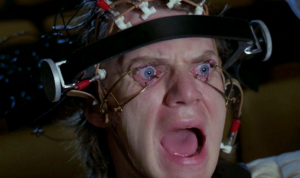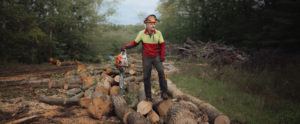Listen to Matthew Crawford’s UnHerd lecture.
We feel gratitude when someone does something for us outside the realm of exchange. One wants to mark it, this arrival of something that overflows what is expected, and recognise the source of it. In acting outside necessity, our benefactor shines.
Or one may feel gratitude without a counterparty to receive it, in response to some fortunate condition that could have been otherwise. Having good health or good looks, for example. Life itself. Something for which we are not responsible, a gift.
Whether in response to good fortune or to some identifiable benefactor, in taking note of this gift one feels that one has regained a proper coordinate system. It is a calm feeling. One shucks off that irritable, constant background sense of not receiving one’s due — the sense of a self inflated beyond its true proportions. For it does feel like a little dose of truth, this moment of reorientation. Seeing oneself from the outside as one who receives rather than demands is also liberating — from resentment, entitlement, grievance. You feel lighter, as well as smaller. And more ready to act with grace toward others; that is, to be larger. For grace and gratitude have the same root, whether one is speaking etymologically or psychologically.
I think our condition as modern people makes the experience of gratitude especially elusive, so when we feel grateful it has an effect that is all the more powerful, bumping us out of a deep spiritual rut. I believe that is because it is an experience that cannot be made sense of in a way that accords with the grand metaphysical picture that we live within most of the time. If we can understand why this is so, it will give us a critical vantage point from which to view our historical moment. It may also help us identify the source of our sourness, and point the way toward something better.
Most simply, gratitude requires that there be another, an outside world that is not under one’s control and not of one’s own making. Of course, it is simply the case that there is such a world. But there are different ways of responding to this fact.
The English philosopher Michael Oakeshott wrote two essays which, if you put them side by side, offer a contrast between two personality types, one he called the rationalist and the other he called the conservative. Here, “conservative” does not refer to a political ideology. Instead, it names a disposition. What distinguishes the conservative is not hankering after the past, but rather affection for the present; for what actually exists. He has an eye for all the ways his surroundings afford a good life, or provide raw materials for the building of such a life. He wants to preserve the present world, not out of fearful, small-minded rejection of the possible, but because he has a greater awareness of the resources of the actual, which may be lost if we are not careful. In other words, he feels gratitude for the world, and a sense of obligation to it.
The rationalist by contrast looks at the world and is offended by the waste, the inefficiency, the chaos, the suffering, the grotesque failures of optimisation, and wants to set it right. He has a vision of a better world, and that is where he lives, in devotion to his vision.
Probably you need both types, to have a healthy society. But in the present order, one of these types is full of confidence and speaks well into a microphone, while the other is apologetic and defensive. One has the wind of history at his back, and is well capitalised. The other sometimes doubts his own sanity.
Our own time has seen the emergence of a third type, the transhumanist, who is perhaps just an over-the-top caricature of the rationalist. Like most caricatures, it brings into relief the defining features of the original through exaggeration.
Here is a quote from a prominent transhumanist, speaking to Paul Kingsnorth (via the Substack Upheaval by N.S. Lyons):
“I’d like to bring your attention to the issue with nature and biology that transhumanists have: that it’s fundamentally flawed, and likely even immoral to perpetuate, given its tendency to predation, disease, and death. Simply said, all nature and biology, from plants, to wildlife, to people, are something to be overcome and totally replaced with the synthetic. No one with even the slightest bit of compassion would ever create a world like ours, filled with so much suffering. It must all be undone, and remade with technology, justice, and equality.”
Clearly there is a theological point at issue here. It is not clear to me if this transhumanist is saying there is a creator (and he is a real bastard), or there is no creator, and nature itself is a real bastard. In any case, the so-called created order is no order at all, but a filthy and cruel chaos. He says it would be “immoral to perpetuate”.
So, the transhumanist speaks as a moralist. He appears to be animated by what Nietzsche called ressentiment, the opposite of gratitude.
In the Gnostic heresy, the world was created, not by God, but by his evil twin (roughly). It must be rejected and overcome through human effort. Doing so requires special knowledge, gnosis, which is to be cultivated in a priestly class. This finds its equivalent in today’s technocratic managers and moral visionaries of equality, aflame with a vision of life beyond suffering that will arrive when the givens of life are “totally replaced with the synthetic”, as our transhumanist put it. The point is to bring about salvation here in this world — Voegelin’s famous “immanentising the eschaton”.
As many have noted, the transsexual ideology is a version of transhumanism, pungently named by Mary Harrington as “meat Lego gnosticism”. From the beginning of the modern rationalist project, the body has been the thorn in the side of it. The creative freedom of the will is compromised by its entanglement with a body subject to natural necessities not of one’s choosing. But if we reconceive the body as raw material — meat Legos — and make man himself a technological project, then we can escape this subjugation to necessities that impinge from outside the will.
But you don’t have to look to the exotic fringe of transhumanism to see this. The whole movement of the present is to bring the world under rational control. For example, substituting algorithms and mechanised certainties for the frailties of human judgment (as in the push for driverless cars and whatnot), or replacing the unclean clamour of democratic politics with expert administration.
We may even take up this approach in relation to ourselves, for example when we seek to eliminate the element of chance and serendipity in love through dating apps that [computer voice:] optimise through personalised search criteria and cross-platform social media integration.
This isn’t quite the madness of Eros, the divine folly, a consuming flame one is cast into by the god despite oneself, to be magnificently destroyed at the feet of one’s beloved, giving thanks all the while from a heart that is glad. Compared to that, life on the dating apps looks like a half-life of prudish solipsism, however many orgasms it may yield. A life fully under control is a life of solitude, from which the possibility of serendipity has been excluded. Serendipity is perhaps the secular name for grace.
The push for rational control has been with us for some centuries, but has lately entered an especially frantic phase, and a jealous determination to leave no area of life untouched by this libido dominandi. Indeed, to trust in fate, or divine providence, or fortuna, is to be downright irresponsible. It’s not safe, for one thing. There is a fearful timidity to the rationalist soul.
***
One way we try to bring the world under our control is by substituting representations for reality itself. The difference is that representations are addressed to us. They are for us; they place each of us at the centre of a little “me-world”, as Thomas de Zengotita points out in his beautiful little book Mediated, whereas dumb nature just sits there, indifferent to us. Nature is genuinely other, a real outside-the-self.
Of course, we are inherently self-centered, quite literally. We inhabit bodies, in particular places, and this gives rise to the spatial categories we use. One carves up the surrounding world along an axis of proximity and distance. The world within reach is the most salient to us. This idea of orientation around a bodily centre helps us to see how the attentional environment that has emerged in contemporary culture is novel and somehow centreless. The basic concept at the root of attention is selection: we pick something out from the flux of the available. But as our experience comes to be ever more mediated by representations, which remove us from whatever situation we inhabit directly, as embodied beings who do things, it is hard to say what the principle of selection is. I can take a virtual tour of the Forbidden City in Beijing, or of the deepest underwater caverns, nearly as easily as I glance across the room. Every foreign wonder, hidden place, and obscure subculture is immediately available to my idle curiosity; they are lumped together into a uniform distancelessness that revolves around me.
But where am I? There doesn’t seem to be any non-arbitrary basis on which I can draw a horizon around myself — a zone of relevance — by which I might take my bearings and get oriented. When the axis of closer-to-me and farther-from-me is collapsed, I can be anywhere, and find that I am rarely in any place in particular. To be present with those I share life with is then one option among many, and likely not the most amusing one at any given moment. It’s hard to be grateful for loved ones when they keep interrupting my feed.
Accepting limits to one’s reach and to the size of one’s world may be necessary if one is to see the gifts that are at hand, if only one has eyes for them. I curse myself for every cheaply squandered opportunity to look into the eyes of my children with the fullness of attention that sees good. That is what is called love.
***
Consider a different kind of attention, which likewise sees good. In a skilled practice, whether it is martial arts, music, or some craft tradition, one enters into an ecology of attention in which one’s perception is tuned to affordances that show up only within this practice. An affordance is a relation of fit between an agent and his or her environment, often mediated by some tool. These affordances are good in the narrow pragmatic sense of being good for some purpose of the agent, not in an ethically laden sense. But they provide the points of contact between the world and a human being who strives for excellence in his or her practice. They create the field of possibilities within which such striving is structured and given form.
If we give due attention to the experience of skilled action, it can give us some critical distance on the ideal of autonomy. Consider music, for example. One can’t be a musician without learning to play a particular instrument, subjecting one’s fingers to the discipline of frets or keys. The musician’s power of expression is founded upon a prior obedience; her musical agency is built up from an ongoing submission. To what? To her teacher, maybe. But there is such a thing as the self-taught musician. Her obedience rather is to the mechanical realities of her instrument, which in turn answer to certain natural necessities of music. For example, halving the length of a string under a given tension raises its pitch by an octave. These facts do not arise from the human will, and there is no altering them. Progress in excellence is only possible if one is capable of enduring a lot of tedium and frustration. I believe the example of the musician sheds light on the basic character of human agency, namely, that it arises only within concrete limits that are not of our own making.
These limits need not be physical; the important thing is rather that they are external to the self. Consider the experience of learning a foreign language, beautifully described by Iris Murdoch:
“If I am learning, for instance, Russian, I am confronted by an authoritative structure which commands my respect. The task is difficult and the goal is distant and perhaps never entirely attainable. My work is a progressive revelation of something which exists independently of me. Attention is rewarded by a knowledge of reality. Love of Russian leads me away from myself towards something alien to me, something which my consciousness cannot take over, swallow up, deny or make unreal.”
In the Platonic tradition, one speaks of such striving as an erotic phenomenon. We are drawn out of ourselves toward beauty. I am reminded of my friend Talbot Brewer’s description of listening to Billie Holiday sing. She tries different phrasings in a given passage, combining them with subtle inflections of pitch, reaching toward some ideal that isn’t fully clear to her as yet, as it comes into view only in the course of her pursuit of it, progressively — in rehearsal presumably, but even during a performance, in real time. To witness this from the audience is exhilarating. The beautiful thing we feel privileged to witness is the music itself, but also the presence of a human being engaged in this striving toward the music that wants to be born. Offstage, as it were, outside the focus of her own attention which is entirely on the music, but visible to us from the audience, we see that she strives also toward a better version of herself, the one who has approached closer to the perfection of her art by pushing beyond the realm where she is certain of the outcome. You feel you are watching a high-wire act.
The risk of failure is intrinsic to the nature of play. Here I am talking about the most serious kind of play, such as music or sport. In his indispensable book Homo Ludens, Johan Huizinga convinces us that in play lie the origins of civilisation. He writes: “To dare, to take risks, to bear uncertainty, to endure tension — these are the essence of the play-spirit.” Thus understood, play sits uncomfortably with the contemporary taste for order, and our attempts to bring the world fully under rational control.
One way we do that is, again, by filtering reality through representations. The deep origins of this tendency lie in early modern thought. Very briefly: Descartes worried about the very existence of an external world. The only secure beginning point for knowledge is awareness of one’s own process of thinking. This is a turning inward. The ensuing revolution was perfectly captured and compressed by Giambattista Vico, who said, “we know only what we make”.
This epistemological anxiety about what we can know was resolved by turning it (tacitly) into an ontological posit about what is. Makeability is the ground of intelligibility, and anything lying outside this circle dops out of consideration. If we can’t make it, then we can’t know it and we have no power over it. It may as well not exist. This was a fundamental shift in man’s relationship to the world.
The most powerful expression of this revolution is mathematical physics. Mathematics is a pure product of the human mind. To do math on nature requires that the world first be rendered more intellectually tractable, by passing it through idealisations such as the frictionless surface, the perfect vacuum, the point mass, and the perfectly elastic collision. As Heidegger put it, this may be understood as “a projection of thingness which, as it were, skips over the things”.
What is made has primacy over what is given directly to experience. That is, what is received. Human beings have always used tools and made things through techne (skill), transforming their environment. The word “technology” names something new. It is a way of grasping the world in which knowing and making are one.
All of this is perhaps very abstract. Let me illustrate it with an example from children’s television. In the old Mickey Mouse cartoons from the early and middle decades of the 20th century, you still get a depiction of the world in which reality has some stature of its own. By far the most prominent source of hilarity is the capacity of material stuff to generate frustration, or rather demonic violence. The tendency of things to thwart the human will is exaggerated, and through exaggeration a certain truth gets brought forward. The slapstick sufferings of Donald Duck acknowledge, and thereby seemed to affirm, the human condition as it is, beneath the various idealisms that would transport us out of that condition.
The Disney cartoon franchise now has many departments. One of them, Mickey Mouse clubhouse, on the Disney Junior network, retains the same characters. But the difference in how material reality is presented could not be more stark, and in this difference a shift in the relation between self and world becomes evident as well.
The clubhouse is filled with amazing technology that always works perfectly. Each episode is built around solving some problem. One does this by saying, “O Tootles!” This makes the Handy Dandy machine appear, a computer-like thing that condenses out of the Cloud and presents a menu of four options on a screen, by the use of which the viewer is encouraged to be a “Mouske-Doer”. There are four problems per episode, and each can be solved using one of the four tools. This assurance is baked into the initial setup of the episode; no moment of helplessness is allowed to arise. There is never an insoluble problem, that is, a deep conflict between the will and the world. I suspect that is one reason these episodes are not just unfunny, but somehow the opposite of funny. What we are watching is the substitution of manufactured experience for a direct encounter with the world. With this comes the construction of a more fragile kind of self, and a more manipulable one. He makes things happen in the world by pressing a button. Which means that his will has been channeled into some “choice architecture” that has been constructed for him by unknown others.
To be a Mouske-Doer is to abstract from material reality as depicted in those early Disney cartoons, where we see the flip side of affordances. Perhaps we should call unwanted projectiles, demonic springs, and all such hazards “negative affordances”. The thing is, you can’t have the positive without the negative; they are two sides of the same coin. The world in which we acquire skill as embodied agents is precisely that world in which we are subject to the frustrations of things; the hazards of material reality. To pursue the fantasy of escaping this through abstraction is to give up on skill, and therefore to substitute technology as magic for the possibility of real agency.
How does any of this bear on the question of gratitude?
Affection for the world as it is could be taken as the motto of a this-worldly ethics. There are, in addition to the slapstick, moments of real physical grace in those old Disney cartoons. When Donald Duck is skating on a frozen lake in one episode, he recruits overhanging branches and snow drifts, incorporating their affordances into a ballet-like performance in which he is able to do amazing things. His skating is amazing, but not fantastical or magical; it is a heightened version of what you admire when you watch a real skater. To watch it is to be surprised and delighted by the real. At such moments, the possibilities for beautiful human action in the world as it is — the undiscovered possibilities of fit — seem inexhaustible.
This can inspire wonder and gratitude; intuitions we associate with religion are available within a this-worldly ethics of attention. For there does seem to be something benevolent in the disposition of things, relative to us. Such are the rules of gravity and buoyancy that surfing is possible. That’s the kind of universe we inhabit. Being alert to such possibilities, and giving their occurrence in the world their due in wonder: to encounter things in this way is basically erotic, in the sense that we are drawn out of ourselves toward beauty.
Such experiences mark the primacy of receiving over making, and require a kind of courage. It is that of entrusting oneself to that which has not been made by oneself, and never could be made, but which supports and makes possible all of our making and doing. If we call such entrusting “faith”, notice that it has the same spirit as play: “To dare, to take risks, to bear uncertainty.”
I like the example of surfing because the ocean is something truly alien and inscrutable. The surfer throws himself into it. Every wave is unique, a gift that can never recur, and they are exquisite. The surfer receives it and does what he can with it. Rarely does he feel adequate to its possibilities. He is not in the right spot when it arrives, due to a failure of paddling strength. Or, if he does catch it, he doesn’t adequately perceive what this particular wave is going to do and he botches it. Or he has a failure of courage, if the wave is big and murderous, and he hesitates. Surfing is 95% frustrated eros, for me at least, due to my own limitations. Oh, but that other five percent. To watch a Kelly Slater is to be forced to recalibrate one’s sense of what a human being can do.
So there’s one datapoint, surfing. Another would be, quite simply, the existence of women’s breasts. Now we have two datapoints, each of which by itself offers full and sufficient proof that there is a God, and that he loves us very much.
The accusation against religion is that it removes us to a different, invisible realm, and is for that reason corrupting. But sometimes you have an experience of God’s love saturating this world, and it is essentially psychedelic. You feel you are gaining perceptual access to the most fundamental layer of reality, the ground of grounds. Quite preposterously, this turns out to be something like love. The effect of such moments is to place you more fully in the actual. With this comes a renewal of our faculty of gratitude. For I do believe it is a faculty, one of those endowments by which a person grasps his true situation.
Matthew Crawford delivered his UnHerd lecture at Old Queen Street on January 9, 2023
Disclaimer
Some of the posts we share are controversial and we do not necessarily agree with them in the whole extend. Sometimes we agree with the content or part of it but we do not agree with the narration or language. Nevertheless we find them somehow interesting, valuable and/or informative or we share them, because we strongly believe in freedom of speech, free press and journalism. We strongly encourage you to have a critical approach to all the content, do your own research and analysis to build your own opinion.
We would be glad to have your feedback.
Source: UnHerd Read the original article here: https://unherd.com/







